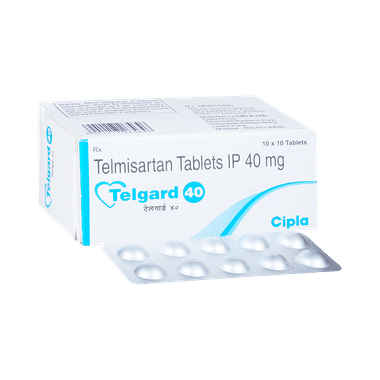Telelak 40 Tablet


Product introduction
Telelak 40 Tablet can be prescribed either alone or in combination with other medicines. It can be taken with or without food, but take it at the same time every day to obtain effective results. It is important to continue taking it regularly even if you feel well or if your blood pressure is controlled. Most people with high blood pressure do not feel ill, but if you stop taking this medicine, your condition could get worse. This is a widely used medicine and is considered safe for long-term use.
Making some changes in your lifestyle will also help lower your blood pressure. These may include regular exercise, losing weight, smoking cessation, reducing alcohol intake, and reducing the amount of salt in your diet as advised by your doctor.
Common side effects of Telelak 40 Tablet include diarrhea, back pain, sinus inflammation, and skin ulcers. Let your doctor know if any of these side effects bother you or worsen. They may be able to help by reducing the dosage or by prescribing you an alternate medicine.
Before taking this medicine, let your doctor know if you have any kidney or liver problems. Pregnant or breastfeeding mothers should also consult their doctor before taking it. Your doctor may check your kidney function, blood pressure, and potassium levels in your blood at regular intervals while you are taking this medicine.
Uses of Telelak Tablet
- Treatment of Hypertension (high blood pressure)
- Heart Failure
- Prevention of Prevention of heart attack and stroke
Benefits of Telelak Tablet
In Treatment of Hypertension (high blood pressure)
In Heart Failure
In Prevention of Prevention of heart attack and stroke
Side effects of Telelak Tablet
Common side effects of Telelak
- Back pain
- Sinus inflammation
- Skin ulcer
- Intermittent claudication
- Diarrhea
How to use Telelak Tablet
How Telelak Tablet works
Safety advice
Tell your doctor immediately if you conceive or are planning a pregnancy while taking Telelak 40 Tablet
However, inform your doctor if you have an underlying kidney disease. Regular monitoring of blood pressure, creatinine, and potassium levels may be advised while you are taking this medicine.
Use of Telelak 40 Tablet is not recommended in patients with severe liver disease.
What if you forget to take Telelak Tablet?
All substitutes
Quick tips
- Take it at the same time each day to maintain stable blood pressure levels.
- Drink plenty of water to stay hydrated while on this medication.
- Regularly check your blood pressure to ensure the medication is working effectively.
- Limit alcohol intake as it can lower blood pressure and increase side effects.
- Do not stop taking Telelak 40 Tablet suddenly without consulting your doctor, as this can worsen your condition.
- Incorporate a healthy diet and regular exercise to enhance the effectiveness of the medication.
Fact Box
Interaction with drugs
Patient concerns
FAQs
Should Telelak 40 Tablet be taken in the morning or at night?
How long does it take for Telelak 40 Tablet to work?
My blood pressure is now controlled. Can I stop taking Telelak 40 Tablet now?
Can the use of Telelak 40 Tablet cause hyperkalemia (increased potassium level in blood)?
If I have some kidney problem, can I take Telelak 40 Tablet? Can it further deteriorate my kidney function?
I am overweight and the doctor has prescribed me Telelak 40 Tablet for blood pressure control. I am bothered that Telelak 40 Tablet can increase my weight. Is it true?
Does Telelak 40 Tablet affect blood glucose levels in diabetics?
Do I need to follow any precautions if I take ibuprofen and Telelak 40 Tablet together?
Does Telelak 40 Tablet work by causing excessive urination?
Related ayurvedic ingredients
Disclaimer:
Tata 1mg's sole intention is to ensure that its consumers get information that is expert-reviewed, accurate and trustworthy. However, the information contained herein should NOT be used as a substitute for the advice of a qualified physician. The information provided here is for informational purposes only. This may not cover everything about particular health conditions, lab tests, medicines, all possible side effects, drug interactions, warnings, alerts, etc. Please consult your doctor and discuss all your queries related to any disease or medicine. We intend to support, not replace, the doctor-patient relationship.References
- Pfeffer MA, Opie LH. Inhibitors of the Renin-Angiotensin-Aldosterone System. In: Opie LH, Gersh BJ, editors. Drugs for the Heart. 8th ed. Philadelphia, Pennsylvania: Elsevier Saunders; 2013. p. 157.
- Briggs GG, Freeman RK, editors. A Reference Guide to Fetal and Neonatal Risk: Drugs in Pregnancy and Lactation. 10th ed. Philadelphia, PA: Wolters Kluwer Health; 2015. pp. 1322-23.
Marketer details
Lab tests offered by us













